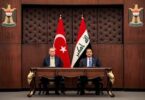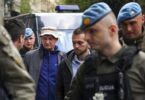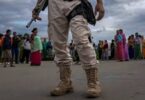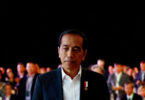Ahmet Gurhan Kartal
LONDON: Britain has stepped up its efforts to investigate the mysterious case of an ex-Russian spy and his daughter falling gravely ill due to suspected poisoning.
As officials said they would respond “appropriately and robustly” to find out what put former spy Sergei Skripal and his daughter in critical condition, Russia denied having any information about the incident. Skripal, 66, and his daughter Yulia, 33, were ad-mitted to hospital after being found unconscious on a be-nch on Sunday in the southern English city of Salisbury.
Emergency services said they believed the father and daughter had been exposed to an unknown substance.
On Wednesday, the Russian Foreign Ministry reiterated that they had no information about the incident. “At the same time we ask that you pay attention to the fact that everything that happened to Skripal was immediately used to ratchet up anti-Russian sentiments,” said a statement.
“Before anything is clarified, speculations started circulating. We see that this [anti-Russian] campaign is well rehearsed with all these statements, including from British officials.”
The statement said Russian officials could not help but conclude that the whole thing was a “provocation aiming to complicate Russia-U.K. relations.”
It added that they had not received any request from British officials for help in the investigation.
During a weekly question session at the House of Commons, Prime Minister Theresa May said the investigation is ongoing, mentioning that she chaired a national security council meeting on Tuesday.
Britain’s Home Secretary Amber Rudd on Wednesday chaired an emergency national security meeting (COBRA) — a mechanism that brings together high-level officials usually after terror incidents — to discuss the investigation, which the country’s counter-terrorism teams are now running. Rudd said following the meeting that the British police now “know more” and will make a statement about the substance thought to have caused Skripal and his daughter’s collapse.
British Foreign Secretary Boris Johnson said it would be wrong to speculate, but the MPs “will note the echoes of the death of [former KGB agent] Alexander Litvinenko in 2006.”
Litvinenko, rumored to be working for British intelligence, died shortly after drinking radioactive tea in a central London hotel. Former KGB bodyguards identified as suspects in the murder have denied any involvement. “I can reassure the House that, should evidence emerge that implies state responsibility, then Her Majesty’s government will respond appropriately and robustly,” Johnson said on Tuesday in an urgent question session at the House of Commons.
Meanwhile, detectives probing the Skripal incident have appealed for public help as scientists are examining an “unknown substance” believed to have been collected from the scene.
Skripal was granted refuge in the U.K. following a 2010 spy exchange between the U.S. and Russia. He had been convicted of “high treason in the form of espionage” by a Moscow military court in 2006 and was sentenced to 13 years in prison after admitting to leaking information to British intelligence services.
The detectives in charge of the Skripal investigation are due to give a press conference Wednesday afternoon. (AA)






